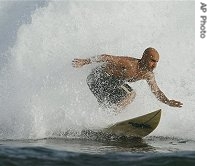2006年VOA标准英语-Senegalese Surf Scene Attracts More Locals(在线收听)
By Kari Barber
Dakar
02 December 2006
This year marks 40 years since the sport of surfing was introduced in Senegal. The country first gained the attention of the surf world with the 1966 surfing documentary "The Endless Summer." In the following decades many tourists came to surf Senegal. Now, more locals are finding their way to the waves. Kari Barber reports for VOA from Dakar.
 |
| Ali Zeia glides across a wave in Dakar, Senegal |
Forty years later, surf tourism has swelled in Dakar, and in the past decade more locals are learning the difficult sport.
Ibrahim Bakhoum lives in Ngor village. He makes a living working at a surf camp on the Island of Ngor. He knows of about 50 local Senegalese surfers. Most of them come from his village of about 2,000 people.
Bakhoum says his family was not happy when he began surfing. "'Do not go to the wave," he says they told him. "You are crazy, it is not a good job.' I like surfing, it is my life. It is my life. They said, 'Ibrahim is crazy.' Not accepted. They said, 'Ibrahim is crazy, is crazy, is crazy."
He says his mother pushed him to take up a safer sport like golf and work as a caddy for foreign tourists at the nearby resort.
But as surfing grew more popular, and Bakhoum started making a living from it, the family accepted his decision.
Bakhoum and surf-camp operator Philippe Apack are taking surfers by boat from the island to the shore. Today they are going to a spot called Secrets.
Australian surfer Mark Pople is on his first trip to Senegal. He says the interaction between tourists and local surfers is not competitive like in many popular surfing destinations.
Camp leader Apack says he is happy when guests enjoy Senegal's year-round waves, but he hopes they will offer local surfers something in return. A used surfboard costs about $200, much too high a price to pay for most Senegalese. "It is a Third World country. It is good for the economy. We have to participate to help their development. So coming here is to enjoy surfing that is a way, but there are other things. We have to help people, bring T-shirts, bring boards to give to the kids. If we are surfers and we travel, we should discover other cultures and help people out," he says.
While he helps tourists find the perfect wave, or at least a good wave, Bakhoum says, ensuring the growth of the local surf scene is his passion. .
As the surf camp wraps up their session at Secrets, they make plans to move down the road where Apack says the waves look better.
Apack says he encourages youth from his Ngor village to try surfing. He tells them it is not just a sport for white affluent people anymore. He hopes they too might have the chance to enjoy Senegal's endless summer.